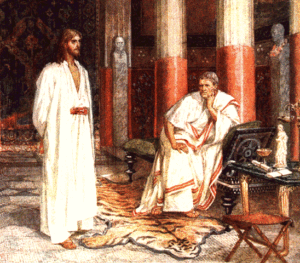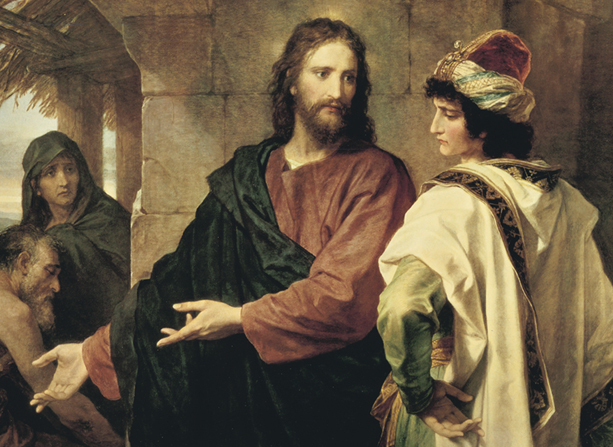When God issued the Ten Commandments through Moses, He summed up every commandment in the first. But being inattentive, we fail to see the key to keeping all of the commandments resides in the first.
Even as children, we know of the Ten Commandments. We know what they are, even if only vaguely. We can recite most of them from memory, occasionally missing one or two. Even if we cannot repeat them verbatim, we instinctively understand the ‘gist of the Ten Commandments.
The knowledge of God, as well as God’s law, is instinctive in man. Even sin, which has infected humanity, cannot wholly erase this intuitive instinct. “For when the Gentiles who do not have the Law do instinctively the things of the Law,” (Romans 2:14). But true to the saying ‘familiarity breads contempt,’ our lifelong familiarity with the commandments has caused us to ignore their importance and to take their message for granted.
Perhaps, we have taken too much liberty with the truth ‘saved by faith through grace,’ and allowed the importance of their keeping to diminish. We must correct this error in judgment, for the New Testament time and time again warns us of the permanence of God’s law: “Do not think that I came to abolish the Law or the Prophets; I did not come to abolish but to fulfill.” (Mathew 5:17).
So, let us take a fresh look at the Ten commandments, overcome our ‘contempt’ of them, and glean some new instruction. In this lesson, we will focus only on the first two commandments, and even then, only taking the portion of their vast spiritual implication necessary to make our point. Hopefully, the words chosen here will help us reveal the exclusive nature and order of the first two commandments.
The first commandment is the foundation of all the others; it establishes, in no uncertain terms, man’s place is in the order of man’s relationship with God; God first, man second. It also points out the most difficult problem man will face in maintaining this relationship (or the keeping of the Law of God). We find both order and problem, condition and cure, in the very first word of the first commandment; “You.”
Proceeding the actual commandments, God makes known to us a distinction exists between Him and us, “I am the Lord your God, who brought you out of the land of Egypt, out of the house of slavery.” (Exodus 20:2). “I am the Lord your God,” and “You” “shall have no other gods before me.” (Exodus 20:3). We see a clear definition of the gulf between God and man created by sin in the two phrases; “I am” and “you shall.”
If we carefully consider this, we will see God is saying (to paraphrase it), I am God, and you are not. If there is a problem that hinders our relationship, the fault is ours. Or in the firstperson tense, the problem is ‘me.’ We are the greatest hindrance to our relationship with our creator, not circumstances we often sight as excuses, us!
“You shall have no other gods before me.” No other gods, spirits, or people will be able to come between our creator and us unless ‘we’ allow it. There can be no misunderstanding. To mend the separation, to close the gap between the Lord and ourselves, keeping ourselves in check is the key. We must make every effort to avoid making ourselves our god, by arrogance or vainglory.
Making ourselves god is all too easy. As adults, we can abuse freedom of choice by making ourselves the only thing we obey. In the majority of our life’s decisions, we have the final say. We are free to choose right or wrong. Therefore when we fail, we can only rightfully blame ourselves. We are authors of our fate, as it were.
Even when we succeed, we must be on constant guard against the arrogance of self. All of the Ten Commandments are ours to keep or break. We hold or break them; we cannot rely on others to observe them for us. God will not keep them for us. The individual responsible for success or failure in their keeping is who you see in the mirror.
YOU shall have no other gods before me.
YOU shall not make for yourself an idol.
You shall not take the Lord’s name in vain.
It’s up to YOU to remember the sabbath day.
YOU shall honor your father and mother.
YOU shall not murder.
YOU shall not commit adultery.
YOU shall not steal.
YOU shall not offer false testimony.
YOU shall not covet anything that belongs to someone else.
It is clear; “I am the Lord your God,” and you are not! “I am the Lord your God,” and if you want a relationship with me, here is a list of what is required, what you are to do and not allowed to do. If we fail in our relationship with our creator, there is no one else to blame. When standing before our Lord, we must not allow anything or anyone (including self) to come between Him and us.
If we fail to understand that we are the problem, we will never keep any commandments. You see the potential to break or keep the rest of the commandments is within us. We have been guilty of being our god, a thief, a liar, an adulterer, a murderer, or lusting after someone, or something that is not ours.
Now that we have unmasked the number one problem in cultivating a relationship with our Creator, the second commandment is an expose’ on God’s unfathomable grace in helping us overcome the same. It shows where the first mistake in our keeping of the law of God is likely to occur. He explains and warns as a loving parent, the key to the keeping of the commandments.
In the second commandment, we read, “You shall not make for yourself an idol, or any likeness of what is in heaven above or on the earth beneath or in the water under the earth. You shall not worship them or serve them.” (Exodus 20:4-5). We could have a long discussion about idols and what constitutes an idol, but let’s zero in on the most common false god and form of idol worship.
In The New American Standard Bible, the words “an idol,” are rendered “graven image” inThe King James version. The New King James translates it as “a carved image,” Giving us a better understanding of the term idol in the theme of the verse. I would be remiss if I overlooked the words ‘for yourself.’ As it again tells us, the warning is not for a group or the world at large. It is a focused reference to you (or us) individually.
For our purposes, we should notice the idol is something made, not something you just found, picked up, or took home and started holding in reverence. It’s something you made with your hands, by your efforts. You carved it; you engraved it; you made it. It is easy to become proud, puffed up, or arrogant over our accomplishments, what we have made, the works of our hands. What is at stake; allowing our achievements or our work to become our idols.
If we are overly proud of what we have or what we’ve made, we could quickly find ourselves in competition with others to have the most prominent house, the neatest yard, the newest car, and the best things in life that we can afford. On their own, there is nothing wrong with the items or accomplishments I’ve mentioned. But, I must pose the question; do your possessions serve you? Or have you become a servant to your amassed possessions?
An idol you made and now serve. Consuming more and more of your time and attention and reducing the time you serve God, violating the rule in verse five: “you shall not worship them, or serve them: for I the Lord your God, am a jealous God.” You cannot help but catch the terms ‘worship’ and ‘serve.’ This describes what happens when your possessions possess you.
Then not only have we constructed ourselves an idol, spending most of our time with its continual care and or upkeep,
but we have also allowed it to enslave us. Maintenance of possessions, so time-consuming, has slowly but surely taken away from service to God. “You shall have no other gods before me.”
Albeit, ‘I would worship with others, but my possessions demand my attention.’ ‘I will pray if there is any time left afterward.’
Forgive me, but I must make a small sidebar in this discussion to address an all-to-common idol. An idol we have elevated to a dangerous place. I refer to it as ‘the-god-in-your-hand:’ the cell phone or smartphone. It’s an invention whose overuse results in death and damage to life and property. It has all of the qualifications of an idol, for what else would demand such absolute attention that you are willing to risk your life, and the lives of others, to use it other than a god!
Returning to Exodus 20:2, “I am the Lord your God, who brought you out of the land of Egypt, out of the house of slavery.” In other words, and expounding a bit, God brings us out of the world (the land of Egypt), which had enslaved us. Rescuing us from slavery, we voluntarily return to slavery by worshiping the works of our hands! The critical choices everyone free faces are to serve the Lord or serve our own ‘golden calf.’
Failing in this test has far-reaching effects. Be warned that the choices you make will affect your children and how they conduct their lives, for better or worse. Will, your children, be slaves to possessions like their parents, or will they be taught that things are never allowed to become idols. They are never to demand more of your time than God and indeed never be worshiped, not even for a second.
Our gracious Lord knew we would break one, some, or all of these commandments. It doesn’t relieve us of the responsibility to keep them. Yet He knows the impossibility of their continual observance because of the infection of sin. So He offers His word of promise, “but showing lovingkindness to thousands, to those who love Me and keep My commandments.”
We find a beautiful summation of the Ten Commandments in Luke 10:27. “And he answered, You shall love the Lord your God with all your heart, and with all your soul, and with all your strength, and with all your mind, and your neighbor as yourself.” Sadly, the person who said them did not comprehend the spiritual implication of his own words. This verse (answer) combines two Old Testament verses, Leviticus 19:18 and Deuteronomy 6:5.
The advent of the Lord Jesus; didn’t replace the Ten Commandments; they are still part of the Christian way of life. Jesus didn’t come to do away with the law but fulfill it. He came to complete it. We can find the strength, even the willingness to keep the law of God through the gift of the Holy Spirit. When we fail, we can see the lovingkindness of forgiveness in the sacrifice of our Lord and Savior, Jesus. He has done what we could not do.
Jesus, God’s only begotten Son, fulfilled the Law of God, making way for us to succeed in keeping the commandments, by always and in all things, putting Him first, before ourselves, before the idols of our accomplishments. Let us partake of the freedom graciously granted by our Lord Jesus by never allowing ourselves to become slaves of our own making.
Just as self is a hindrance to keeping the law of God, accepting the sacrifice of Jesus as the only solution to our salvation can be as well. We cannot save ourselves. We must guard against the feeble attempts of self in doing so. It cannot be our way and God’s way; it can only be God’s way.
A thought inspired me while I was finalizing these notes. I discovered a question I could use to measure the invasion of self in my relationship with my Lord. How many times do we pray for our wants and needs versus the needs of others? Do we seek His will for our lives, or are we guilty of asking His blessing on our efforts?
Let us seek to overcome ourselves by God’s unchanging grace.










+ There are no comments
Add yours